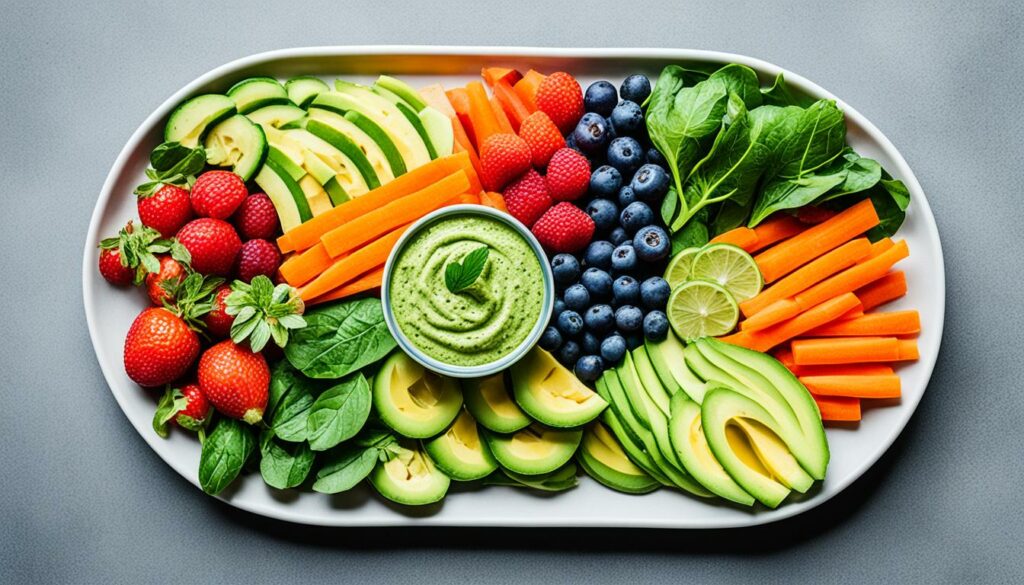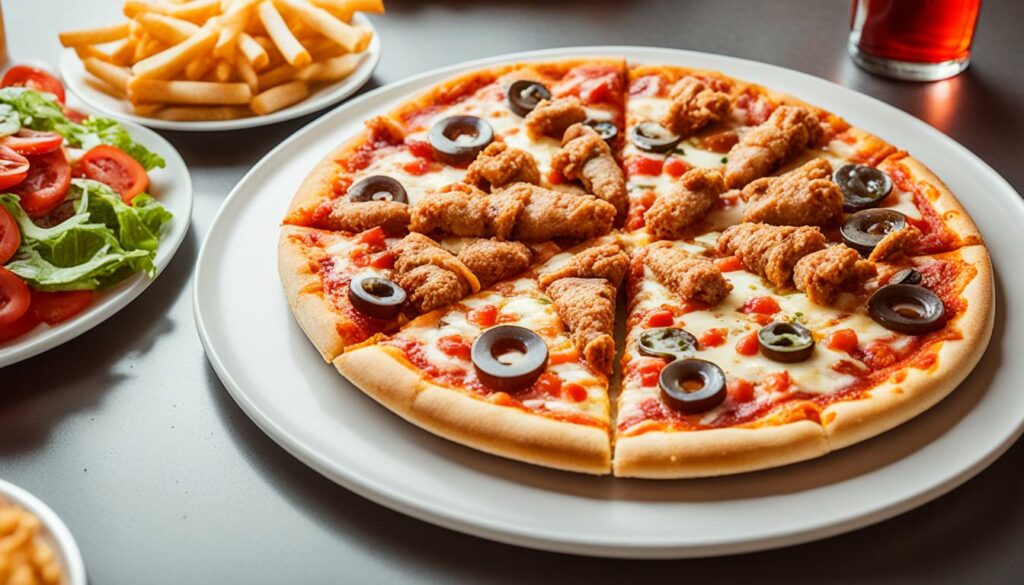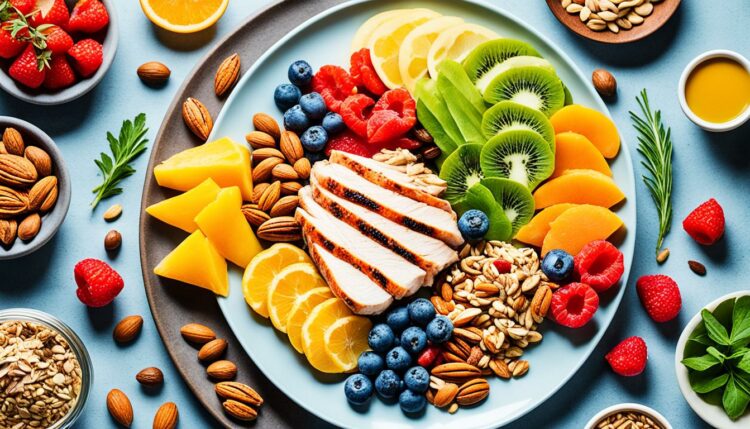Did you know that the foods you choose to break your intermittent fast can have a significant impact on your overall health and well-being?
It’s not just about ending the fast, but also about nourishing your body and supporting your post-fast goals. So, what are the best foods to break intermittent fasting optimally?
To make the most of your post-fast meals, it’s essential to select nutrient-dense options that provide a mix of protein, fiber, and essential nutrients. By choosing the right foods, you can optimize the benefits of intermittent fasting and ensure a healthy transition from fasting to eating.
Key Takeaways:
- Choosing the right foods to break intermittent fasting optimally is crucial for overall health and well-being.
- Opt for nutrient-dense options that provide a mix of protein, fiber, and essential nutrients.
- Avoid excessive carbs, refined carbohydrates, sugary beverages, and ultra-processed foods when breaking a fast.
- Consult with a healthcare professional or nutritionist for personalized advice.
- Make sure to practice portion control to prevent digestive discomfort.
What to Eat to Break Your Fast (Shorter, Time-Restricted Eating Fasts)
When it comes to breaking shorter, time-restricted eating fasts, such as the 18:6, 16:8, and 14:10 plans, it’s crucial to choose the best post-intermittent fasting foods that will support your health and nourish your body.
By selecting the right meals, you can ensure a smooth transition from fasting to eating, avoiding blood sugar spikes and hunger pangs.
Avoiding carb-loaded meals and sugary drinks is essential, as they can disrupt your body’s metabolic state and leave you feeling unsatisfied. Instead, opt for low-glycemic meals that are rich in whole foods and balanced with protein and healthy fats.
These optimal post-intermittent fasting foods will provide sustained energy and keep you satiated until your next meal.
Here are some intermittent fasting meal ideas to consider:
- Include fermented foods like sauerkraut, kimchi, or yogurt for their probiotic benefits.
- Load up on leafy greens such as spinach, kale, or arugula for essential vitamins and minerals.
- Add cooked vegetables like broccoli, cauliflower, or zucchini to your meal for fiber and antioxidants.
- Sip on vegetable juices like carrot or beet juice for a nutrient-packed beverage.
- Munch on raw fruits like apples, berries, or oranges for natural sweetness and fiber.
- Spread some nut butter, like almond or cashew butter, on whole-grain crackers or toast for a satisfying snack.
- Incorporate lean sources of protein like fish, poultry, or eggs to support muscle repair and growth.
- Enjoy meats such as lean beef, turkey, or chicken for a nutrient-dense meal.
- Sip on bone broth, a collagen-rich liquid that provides essential amino acids for joint and gut health.
- Include healthy fats like coconut oil or avocado in your meal for added satiety and flavor.
Remember, these are just a few intermittent fasting meal ideas to consider. Feel free to mix and match ingredients to create delicious and satisfying meals that suit your taste preferences and dietary needs.
By incorporating these best post-intermittent fasting foods into your diet, you can optimize the benefits of intermittent fasting and ensure a healthy transition from fasting to eating. However, it’s always recommended to consult with a healthcare professional or nutritionist for personalized advice and guidance.
How to Break an Extended Fast (A Day or More)
Breaking an extended fast requires a bit more caution and planning. It’s crucial to avoid excessive carbs and sugar, as well as opt for easily digestible foods and small portions. Start by easing back into eating with nourishing soups and cooked vegetables, as they are easier for the body to digest.
Avoid dense meats initially, as they can be harder on the digestive system. Focus on consuming healthy proteins, such as fish and poultry, which provide essential nutrients for muscle repair and overall well-being. Other options include bone broth, healthy fats, fruits, nuts, and eggs.
Easing into eating after an extended fast allows the body to gradually adjust and prevents digestive discomfort. Nourishing soups made from bone broth and cooked vegetables are gentle on the digestive system and provide essential vitamins and minerals.
These soups can be made with a variety of vegetables, such as carrots, celery, and spinach, and seasoned with herbs and spices for added flavor.
Additionally, incorporating healthy proteins into your post-fast meals is important for muscle repair and overall well-being. Fish, such as salmon or trout, is rich in omega-3 fatty acids and provides high-quality protein.
Poultry, like chicken or turkey, is lean and packed with essential nutrients. Including a mix of proteins in your meals ensures you’re getting a variety of amino acids, which are the building blocks of proteins.
While breaking your extended fast, it’s also important to include foods high in healthy fats. Avocados, coconut oil, and olive oil are excellent sources of healthy fats that provide energy and support brain function. Adding a teaspoon of these oils to your meals can help increase satiety and promote a feeling of fullness.

| Recommended Foods for Breaking an Extended Fast | Benefits |
|---|---|
| Nourishing Soups | Easily digested, provide essential vitamins and minerals |
| Fish and Poultry | High-quality protein, essential nutrients for muscle repair |
| Bone Broth | Supports gut health, provides collagen and amino acids |
| Healthy Fats (Avocados, Coconut Oil, Olive Oil) | Provides energy, supports brain function, increases satiety |
| Fruits and Nuts | Source of natural sugars, healthy fiber, and essential nutrients |
| Eggs | High-quality protein, essential nutrients for overall well-being |
As you reintroduce foods and end your extended fast, listen to your body’s cues and adjust your portions accordingly. Remember, it’s essential to break your fast with nourishing foods that support your overall health and well-being.
What Not to Eat When Breaking a Fast
When breaking a fast, it’s crucial to be mindful of the foods you consume. Certain foods can undermine the benefits of fasting and potentially cause discomfort. To ensure a smooth transition from fasting to eating, it’s important to avoid the following:
- Excessive Carbs: Refined carbohydrates and sugary beverages can cause blood sugar spikes and lead to increased hunger. It’s best to steer clear of these foods to maintain stable energy levels and prevent cravings.
- Difficult-to-Digest Foods: Foods that are hard to digest, such as steak and raw cruciferous vegetables, can strain your digestive system after a fast. Opt for easily digestible options to give your body the nutrients it needs without overwhelming it.
- Ultra-Processed Foods: Hot dogs, potato chips, and other ultra-processed foods may be tempting, but they are not the ideal choices when breaking a fast. These foods are often high in unhealthy fats, sodium, and additives that can be detrimental to your health.
- Lactose-Containing Foods (for lactose intolerant individuals): If you have lactose intolerance, consuming foods containing lactose can lead to digestive discomfort. Consider taking digestive enzymes specifically designed to aid in lactose digestion when breaking your fast.
By avoiding these foods, you can optimize the benefits of fasting and make the most out of your post-fast meals.

It’s essential to listen to your body and choose nutrient-dense, healthy options that nourish you during this transition. Remember, consulting with a healthcare professional or nutritionist can provide personalized advice on breaking a fast and achieving optimal health.
Conclusion
When it comes to breaking your intermittent fasts, choosing the best foods is key to supporting your health and well-being. Opt for nutrient-dense options that provide a mix of protein, fiber, and essential nutrients to nourish your body.
By avoiding overeating and focusing on portion control, you can prevent digestive discomfort and optimize the benefits of intermittent fasting.
Remember to consult with a healthcare professional or nutritionist for personalized advice on the best foods to break your fast. They can provide guidance tailored to your individual needs and goals.
Whether you’re following shorter time-restricted eating fasts or breaking extended fasts of a day or more, the right food choices can help you achieve optimal health.
As you transition from fasting to eating, consider incorporating foods like fermented foods, leafy greens, cooked vegetables, vegetable juices, raw fruits, nut butters, fish, poultry, eggs, meats, bone broth, and healthy fats like coconut oil and avocado.
These foods provide essential nutrients while supporting digestion and overall well-being. Remember, the key is to nourish your body and enjoy healthy post-fast meals.
FAQ
What are the best foods to break intermittent fasting optimally?
The best foods to break intermittent fasting optimally are whole foods that provide a mix of macronutrients.
Opt for low-glycemic meals balanced with protein and healthy fats, such as fermented foods, leafy greens, cooked vegetables, vegetable juices, raw fruits, nut butters, fish, poultry, eggs, meats, bone broth, coconut oil, and avocado.
What should I eat to break shorter, time-restricted eating fasts?
When breaking shorter, time-restricted eating fasts, it’s essential to choose whole foods and incorporate a mix of macronutrients. Avoid carb-loaded meals and sugary drinks. Instead, opt for low-glycemic meals that are balanced with protein and healthy fats.
Recommended foods include fermented foods, leafy greens, cooked vegetables, vegetable juices, raw fruits, nut butters, fish, poultry, eggs, meats, bone broth, and healthy fats like coconut oil and avocado.
How should I break an extended fast?
Breaking an extended fast requires caution and planning. It’s crucial to avoid excessive carbs and sugar, opt for easily digestible foods, and start with small portions. Begin by easing back into eating with nourishing soups and cooked vegetables.
Focus on consuming healthy proteins, such as fish and poultry, along with bone broth, healthy fats, fruits, nuts, and eggs.
What foods should I avoid when breaking a fast?
When breaking a fast, it’s important to avoid certain foods that can undermine the benefits of fasting and potentially cause discomfort. Steer clear of excessive carbs, especially refined carbohydrates and sugary beverages.
Avoid difficult-to-digest foods like steak and raw cruciferous vegetables. Ultra-processed foods like hot dogs and potato chips should also be avoided. If you have lactose intolerance, consider taking digestive enzymes when ending your fast.
How can I optimize the benefits of intermittent fasting and nourish my body?
To optimize the benefits of intermittent fasting and nourish your body, choose nutrient-dense options that provide a mix of protein, fiber, and essential nutrients. Avoid overeating and focus on portion control to prevent digestive discomfort. Consult with a healthcare professional or nutritionist for personalized advice.




